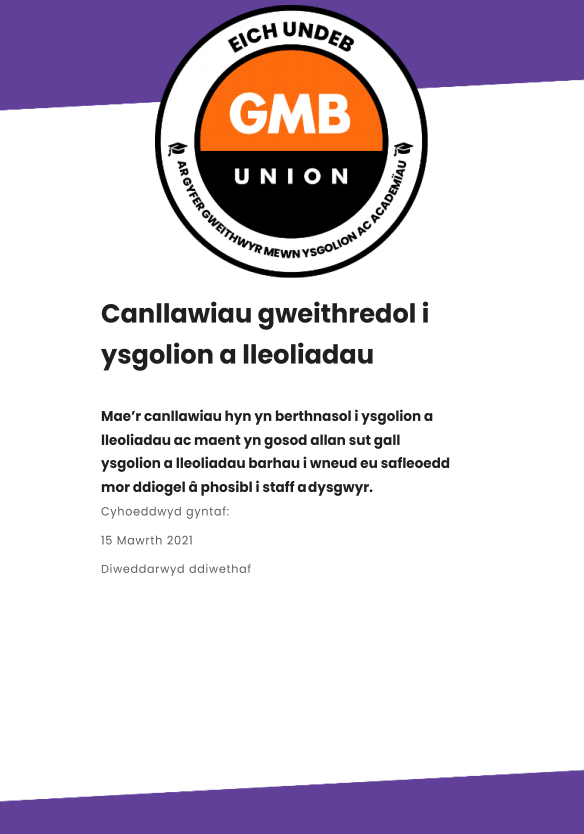Schools, Academies & Education
Schools Staff in Wales Noticeboard
Further Links
UPDATED: WELSH GOVERNMENT OPERATIONAL GUIDELINES FOR SCHOOLS
WELSH GOVERNMENT OPERATIONAL GUIDELINES FOR SCHOOLS
Posted on:
The Welsh Government has published it's formal advice to schools supporting limited attendance from March 15th, available at gov.wales.
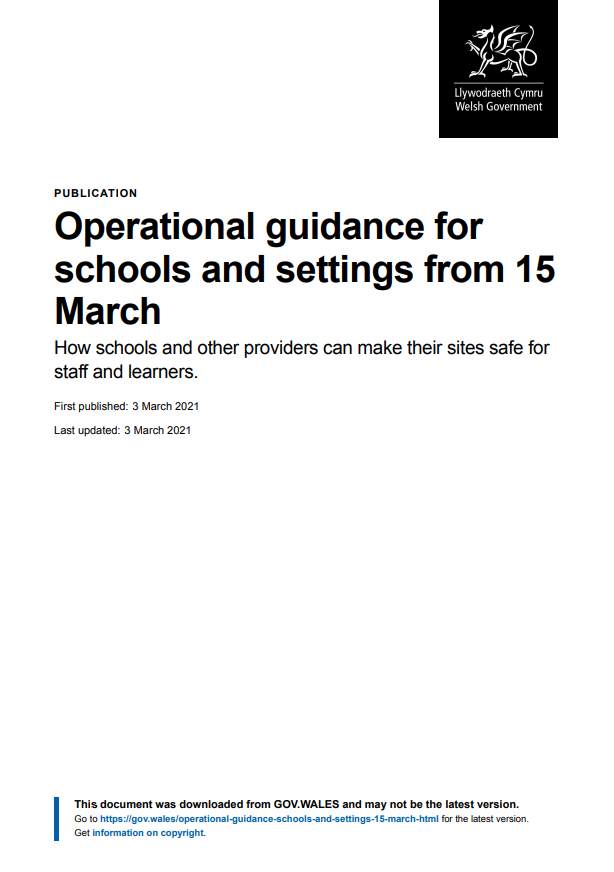
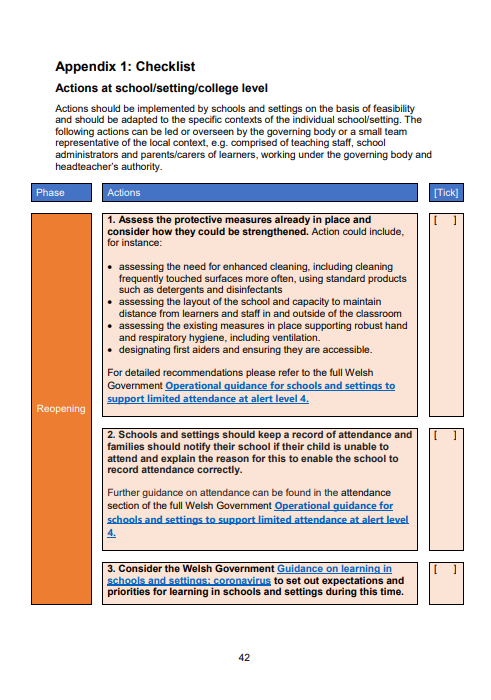
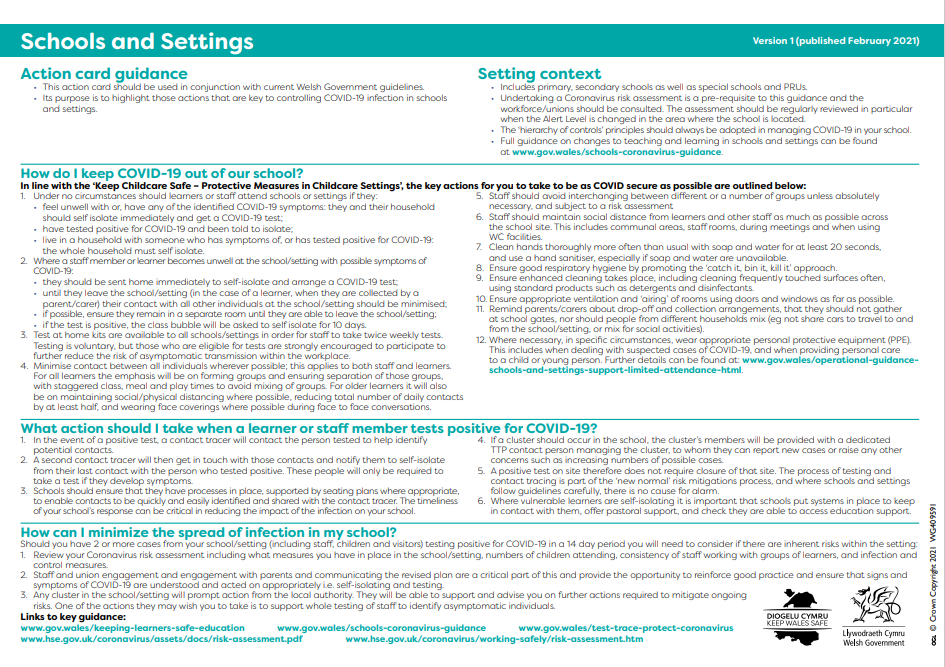
Noticeboard Bulletin - 10-02-2021
Posted on:
ONLINE BRIEFING FOR SCHOOL STAFF IN WALES
6PM, 10th February
NATIONAL EDUCATION WORKFORCE SURVEY FOR WALES
Arolwg cenedlaethol gweithlu addysg Cymru
Mae’r arolwg gweithiwr cymorth dysgu ysgol ar agor (cau 9 Ebrill 2021).
ewc.wales/aga-ews/index.php/cy/
The school learning support survey is now open (closing 9 April 2021).
ewc.wales/aga-ews/index.php/en/
COVID-19 EDUCATIONAL SETTINGS RISK ASSESSMENT TOOL
UPDATED GUIDANCE TO SUPPORT LIMITED ATTENDANCE FROM 22ND FEBRUARY:
The Welsh Governments' updated guidance is available here
ONLY WORK TO YOUR CONTRACT OF EMPLOYMENT
GMB School Support Staff work under the pay terms and conditions of the Green Book, apart from a very small number of members in multi-academy trusts with whom GMB negotiates separately (that don’t follow the Green Book).
GMB is a recognised trade union that has been negotiating pay agreements and Covid guidance that ensure you are paid your wages.
GMB will continue to ensure no school support staff lose out on pay during Covid-19.
Teachers' Unions have no jurisdiction on your pay terms and conditions of work and do not represent school support staff employed under Local Government Green Book Terms and Conditions.
We have members contacting us saying that they feel compelled to work beyond their contracted obligations. As many teachers work on-line it is school support staff are being left to lead the classroom.
GMB has already negotiated guidance that employers should be following please see an extract from the NJC Circular which remains the case:
|
We would remind employers of the more general guidance from the NJC regarding redeployment and the need to ensure volunteers are sought first (volunteers should not be sought from employees who live with and / or have caring responsibilities for people in the vulnerable groups referenced above) and relevant training and risk assessments are undertaken (see NJC 170320 CIRCULAR). Unless there are urgent, mitigating reasons, employers should not require staff who do not have experience of supervising large groups of children as part of their usual role, to be doing so now without adequate support being provided. Employees who agree to undertake a different role and / or working pattern should suffer no financial detriment and continue to be paid at their usual contracted rate. Where employees are temporarily undertaking roles that are paid at a higher rate than their usual contracted rate, they should receive the higher rate of pay for the duration of the assignment / redeployment.
|
GMB strongly advises against working outside your contracted obligations and have set out advice on how to challenge your employer. Please see a sample letter that you can ask your GMB rep to issue if you feel unable to:
|
Dear Headteacher, Similar to the first lock-down schools remain open to all key workers and vulnerable children. As we move into lock-down 3 some schools are intending to allow all teachers to work remotely and support staff are expected to attend work, (on a rota basis in some cases), to support the children who are in school. My union GMB finds this approach unacceptable and are supported in this position by other unions. Can you please confirm our school will run on a shared rota basis as in the previous lockdown? I am aware you are extremely busy, but a prompt reply would be appreciated. Kind Regards. |
MAKE SCHOOLS SAFE - RISK ASSESSMENT
‘It is a legal requirement that schools should revisit and update their risk assessments (building on the learning to date and the practices they have already developed). It is good practice to treat risk assessments as a “living document” which is kept under review, especially having regard to changing circumstances.’
GMB will continue to support you in challenging your employer to make your working environment safe. It is important to stress that any member working previously under a personal risk assessment (such as staff who are Clinically Vulnerable) should have risk assessments reviewed in response to the new strain of Covid.
GMB have a two-step letter process in place.
Request for a Revised Risk Assessment (Letter 1)
Working from Home letter if the workplace is unsafe (Letter 2)
This two-stage letter process will help to build added protection for you at work.
Letter 1 seeks a revised risk assessment and if this assessment is insufficient (or not undertaken) you are better protected to raise the H&S breaches and for GMB to be able to tell your employer why you feel unsafe and want to work from home.
We want you to know GMB has your back on this issue, so please speak to a rep before sending the first letter. Your GMB rep can advise you on both letters. If you are not sure who your GMB rep is, please contact your region.
VULNERABLE GROUPS
Risk Assessments remains key to ensuring you feel safe at work. GMB has also negotiated additional advice that fall into the category of vulnerable staff as follows:
The advice is titled Working from Home and your union negotiated this at the start of the pandemic.
Please read it in full here.
We highlight the following:
|
Local Authorities will have employees who are in the vulnerable groups where they could be looking at months of working at home. This group includes those who are:
People falling into this group are those who may be at particular risk due to complex health problems such as:
Roles that do not readily lend themselves to working at home
This circular sets out considerations for employees who are otherwise well but cannot attend their normal place of work due to the Government’s instruction for people to work at home and avoid all nonessential travel. As previously advised, all options for using annual leave, special leave etc should be explored but given the length of time that this national emergency is set to last it is not reasonable, for example, to expect employees to use their entire annual leave entitlement to cover all or part of the lockdown period as consideration should be given to planned booked holidays later in the year, along with employees who may require leave throughout the year to support dependents. The position relating to all support staff in schools presents particular challenges. Current guidance is that schools are to remain open unless specific circumstances dictate otherwise. At such time as the expected closure of schools is announced, council employers will need to work quickly with Head Teachers and School Business Managers to ensure consistency of approaches to home working as applied to corporate council employees and school-based employees. Ultimately, in many cases employers will have no option other than to accept that some employees can neither work at home nor be redeployed / seconded etc and will therefore be staying at home on full pay for the duration of this emergency. |
STAY CONNECTED
- Contact your local GMB rep if you are worried about your safety at work.
- If you do not have a workplace rep on-site consider becoming one
- Pass this briefing to a non-union member and ask them to join
- Stay in touch with us join our GMB Schools group on Facebook and contact us by emailing us at schools@gmb.org.uk
- Join a GMB virtual meeting - we arrange these on a weekly basis and will post details on our social media accounts – the next National Meeting is:
5.30pm – Thursday 21st January
REGISTER @ gmb.org.uk/makeschoolsafe
Joint Union Guidance for January-February opening during lockdown
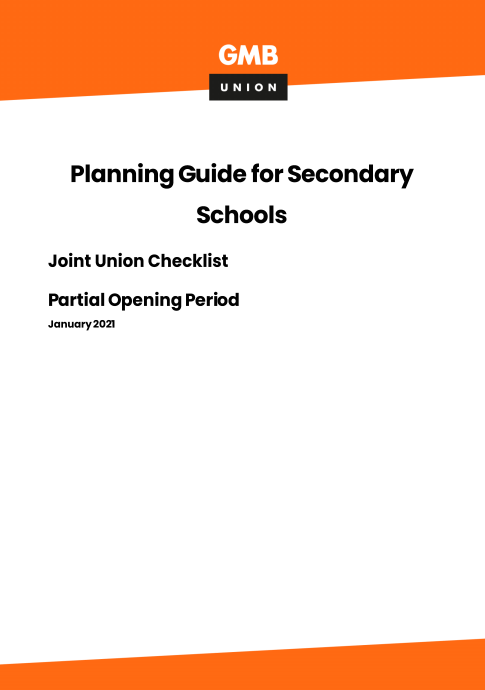
Joint Union Advice on Medically Vulnerable and Higher Risk Groups (England)
The joint union guidance for vulnerable employees was updated on December 2nd.
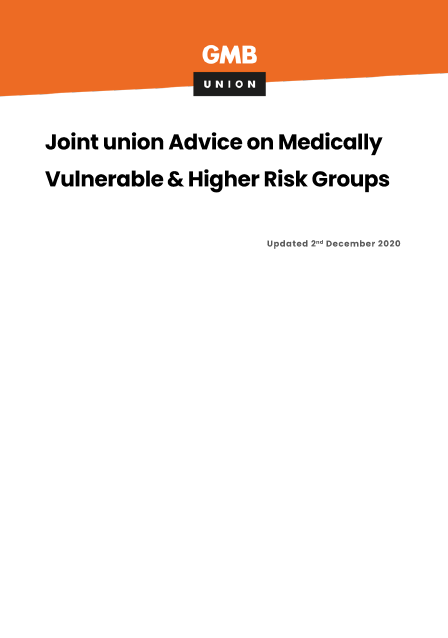
Following the announcement by the government that it intends to keep schools fully open during the lockdown in England and the second wave, GMB, UNISON, UNITE and NEU have produced an updated safety checklist for schools.

Serious health and safety failings – escalation letter (England)
We have produced a model letter for branches to send to any school where there are concerns around serious COVID health and safety failings that are putting members at serious and imminent danger. This could include instances, for example, where a school is refusing to allow staff and pupils to wear face coverings, advising staff to ignore quarantine advice, etc.
Please speak to your branch or regional officer before sending.
NHS Test and Trace app (England)
A small number of schools have told staff to turn the NHS app off the whole time when they are in schools, or to ignore alerts on the app advising them to self-isolate. This is wrong. Department for Education guidance is clear that pausing contact tracing in schools is only recommended in three situations. For more information please see the guidance below.
Joint Union Guidance from the September 2020 Return
The Joint Unions in Secondary Education have released a Checklist for Reps in relation to the DfE Guidance for a wider school reopening in September.

Enabling Renewal Report: Colleges Wales
Posted on:
The report detailing the future plans for Further Education in Wales is available on Colleges Wales website.

